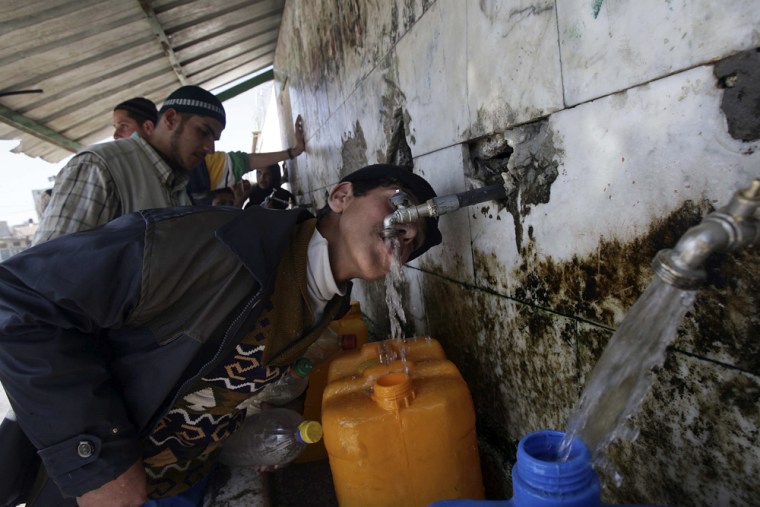Israel's blockade of the Gaza Strip has created the worst humanitarian crisis since its occupation began in 1967, a human-rights coalition said Thursday.
Food shortages, crumbling health services and a water and sewage system close to collapse are all part of the daily misery facing 1.5 million Palestinians in Hamas-controlled Gaza, a scathing report by British relief groups said.
"As we speak, sewage is literally pouring into the streets," said Geoffrey Dennis, head of CARE International, one of the eight non-governmental organizations behind the report.
"Over the past three weeks we've only been able to send in food and medicine and the aid dependency is rising."
Israel imposed restrictions on the flow of people and goods and virtually froze economic activity last June when Hamas Islamists seized control of Gaza.
80 percent rely on food aid
The report painted a picture of an enclave held hostage by the embargo, which it said had worsened poverty, crippled education services and made 1.1 million people -- 80 percent of the population -- dependent on food aid. That compares to 63 percent in 2006.
The groups said that hospitals are suffering from power cuts of up to 12 hours a day while
almost 18 percent of patients seeking emergency treatment outside Gaza last year were refused permits to leave.
It said overall unemployment is close to 40 percent.
The report follows strident international condemnation of Israel after it struck hard against Palestinian militants in Gaza, killing more than 120 in the past week, including many civilians, after Palestinians militants escalated their daily rocket fire at Israel.
The Palestinian rockets have killed 13 people, wounded dozens more, traumatized thousands and caused millions of dollars in damage.
Israel tightened the blockade in January, limiting supplies of fuel and other goods in what it described as a response to cross-border rocket fire by militants.
Israel's Defense Ministry rejected the report, blaming the militant Hamas rulers of Gaza for the hardships.
"The main responsibility for events in Gaza -- since the withdrawal of Israel from the territory and the uprooting of the settlements there -- is the Hamas organization, to which all complaints should be addressed," read a statement by spokesman, Maj. Peter Lerner.
'Utterly indefensible'
But Amnesty International UK Director Kate Allen said Israel must protect its citizens, "but as the occupying power in Gaza it also has a legal duty to ensure that Gazans have access to food, clean water, electricity and medical care."
She added: "Punishing the entire Gazan population by denying them these basic human rights is utterly indefensible. The current situation is man-made and must be reversed."
Israel removed all 21 settlements and withdrew its forces from Gaza in 2005. Israel maintains that ended its occupation, but rights groups say that since Israel still controls Gaza's land, sea and air access, it is still the occupier.
After Hamas militants seized control of Gaza in June, Israel closed its crossings, allowing only shipments of vital goods into Gaza.
The 16-page report -- sponsored by Amnesty, along with CARE International UK, CAFOD, Christian Aid, Medecins du Monde UK, Oxfam, Save the Children UK and Trocaire -- calls on the British government to exert greater pressure on Israel and to reverse its policy on not negotiating with Gaza's Hamas rulers.
Israel and the West shun Hamas and label it a terrorist organization. Hamas does not accept the presence of a Jewish state.
Replying to the report, Israel's Defense Ministry said medicines and medical equipment are shipped into Gaza with no limitation. On Wednesday, a typical day, the military said it allowed 69 truckloads of supplies into Gaza, including basic food and baby formula.
However, a senior U.N. official warned the dire conditions outlined in the report would be worsened by any escalation of Israeli military action in response to indiscriminate rocket attacks from Gaza.
"It would be devastating," John Ging, director of United Nations Relief and Works Agency in Gaza, told Reuters by telephone.
